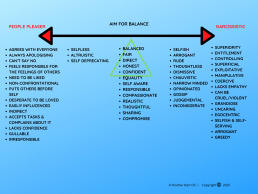NPD
In recent years the term Narcissistic Abuse has become a popular term used to describe a wide range of negative traits, from selfishness to arrogance. It is important to note that an individual displaying Narcissistic traits doesn’t necessarily have a Narcissistic Personality Disorder (NPD). It is unwise to diagnose or label someone as having a personality disorder without first seeking a professional medical opinion. NPD is a mental health condition that should only be diagnosed by a qualified psychologist.
A Balancing Act
If you imagine we are all on a scale (Fig 1), and while we may aim to always be in the middle of the scale, most of us are guilty of occasionally being selfish, arrogant, thoughtless or judgemental, even if we don’t really like admitting to it. It is important we remain mindful of our behaviour and how our words and actions impact on others. There is a saying; familiarity breeds contempt, its very easy with people we’ve enjoyed relationships with for a long time to take those people for granted. We may become complacent, be less thoughtful because we expect them to understand and forgive us because they care about us. This is true of all relationships, romantic partnerships, child/parent relationships, siblings, friends colleagues, etc. Most of us can be guilty of being a bit selfish, especially when we are tired or feeling lazy. “Do me a favour! make a cuppa, I can’t be arsed!”
It is important we are mindful of this, ensuring we don’t leave ourselves out of the judging whenever we are judging others.
Acknowledging, apologizing and taking ownership of our negative behaviours is a sign of emotional maturity. For those of us who have been on the receiving of narcissistic behaviours, we need to ensure we don’t pick these traits up, inadvertently continuing the cycle and negatively impacting on others.
We live in a society that encourages and rewards some narcissistic traits as demonstrated in the STAND – a toolkit for prevention toolkit training.
Some narcissistic traits are being referred to as ‘Healthy Narcissism’, which include traits such as ‘unwavering confidence and self belief, focused determination, lack of empathy, well organisation, excellent delegators, charismatic, etc, traits often found in successful, high-flying business people.
Given the fact that Narcissistic behaviours are incredibly destructive to victims, my personal view is that ‘Healthy Narcissism doesn’t really exist, there is nothing ‘healthy about destructive behaviours in my opinion, and very much sounds like a narcissists way of excusing their behaviour and shirking responsibility.
Fig. 1
